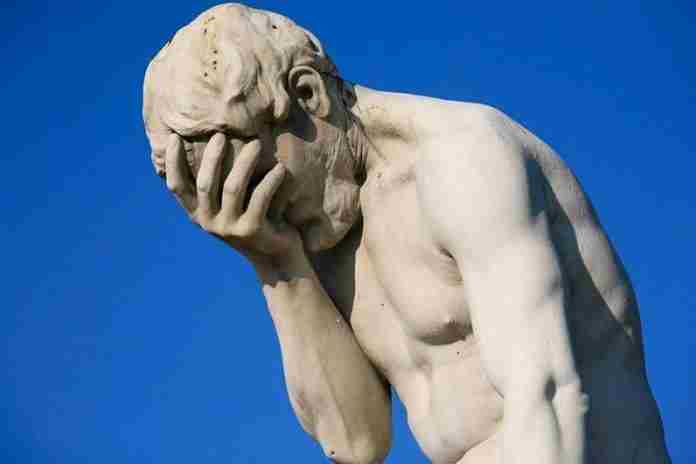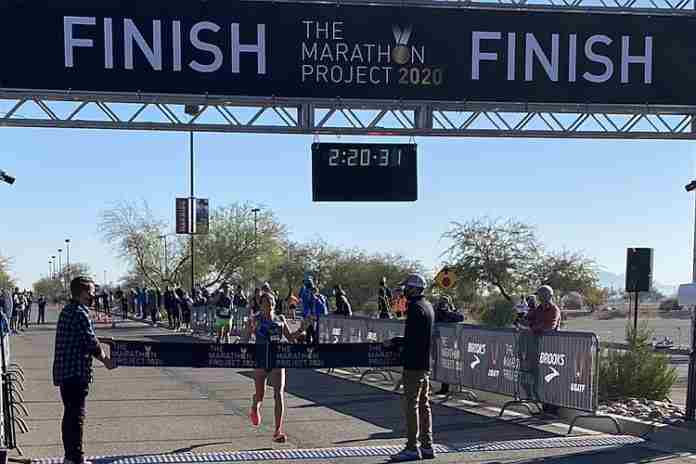(★ Friends: Fantastic! Just received the 19th donation toward the new bill for server and support costs; with the overage from the prior request, we’re at 58% of our goal. This isn’t the easiest time to ask, but if you would like to help, please donate here. Your enthusiasm is the reason this site continues. ★)
The latest news, notes and quotes from the worldwide Five-Ring Circus:
● World Anti-Doping Agency vs. RUSADA ● Thursday’s announcement of the decision by the Court of Arbitration for Sport to sanction the Russian Anti-Doping Agency (RUSADA) for two years was hailed by the World Anti-Doping Agency, but it may not stop hundreds of Russian athletes from competing in Tokyo in 2021.
While “banning” Russia from the Tokyo Games next year and the Beijing Winter Games in 2022 – plus the Paralympic Games and World Championships during the same period – the CAS order states that Russian athletes may participate if:
“The Athlete/Athlete Support Personnel shall not be subject to suspension, restriction, condition or exclusion imposed by a competent authority in any past or future proceedings which remains in force at the time of the specified event.”
The International Olympic Committee, to its dismay, seized on this language right away in its brief comment on the decision:
“The IOC has taken note of the CAS decision. It will now carefully evaluate the award and its consequences for competitions within the Olympic Movement, in particular with regard to the Olympic Games Tokyo 2020 and the Olympic Winter Games Beijing 2022. In this respect, the IOC will consult with the International Federations and the International Paralympic Committee with a view to having a consistent approach in the implementation of the award.”
The IOC correctly sees a potential replay of Rio 2016 coming, where Russia had 284 athletes competing (142 men and 142 women), down from 429 in 2012 and 454 in 2008, but still the 11th-largest delegation at the Games.
And the U.S. Olympic & Paralympic Committee picked up on this in its mostly unhappy statement, including:
“[T]he U.S. Olympic & Paralympic Committee is gratified by the elements of the CAS ruling upholding WADA’s strong sanctions against Russian sport organizations, and deeply disappointed by other elements of the ruling that materially weaken these sanctions. …
“Whatever the final effect of implementation of the CAS ruling, we must acknowledge that it is only the latest chapter in a terrible story of a calculated, and at least partially successful scheme, to attack clean athletes and fundamental Olympic and Paralympic values. …
“The USOPC has heard clearly from our own athlete representatives their view that there is an urgent need for leadership and deep, expedient changes to the current governance, systems, and organizations responsible for the international anti-doping movement.” (Emphasis added)
U.S. Anti-Doping Agency head Travis Tygart was simply furious, and blames WADA for the outcome, not the court:
“USADA acknowledges the devastating decision from the Court of Arbitration for Sport (CAS) in the Russia case that hands WADA and clean athletes a significant loss. At this stage in this sordid Russian state-sponsored doping affair, now spanning close to a decade, there is no consolation in this weak, watered-down outcome. …
“Throughout the investigation and now with this weak outcome, it’s clear that WADA – even with new leadership and promises of change – has told athletes that it did not hear them and that they don’t matter. Russia has claimed victory today and, for them and their ability to corrupt global sport, deceive the world, and cheat the global anti-doping system, they are right.”
Acting RUSADA head Mikhail Bukhanov was enthusiastic:
“Today’s results is a victory for Russia, CAS did not limit the rights of clean athletes to take part in the Olympics, Paralympics and world championships. The court made the decision to accept the provisions which WADA was pushing through. Undeniably, this is a significant precedent.”
Now comes more politics, determining who can and cannot compete in Tokyo in 2021 and at Beijing 2022 among other events. There are Russian presidents of three International Federations: fencing, shooting and boxing (although AIBA is under IOC suspension and not involved in Tokyo 2020). Most IFs looked the other way in 2016, with the major exception of World Athletics, which allowed only one Russian athlete (who was training in the U.S.) to compete.
The Russian Athletics Federation is still under suspension by World Athletics, but there are eight Russian stars named in the World Athletics doping pool for 2021 according to RUSADA, meaning they could be eligible as neutrals:
“The new list still includes Maria Lasitskene, Mikhail Akimenko and Ilya Ivanyuk [high jump]; Anzhelika Sidorova and Timur Morgunov [pole vault]; Ilya Shkurenev [decathlon]; Sergei Shubenkov [110m hurdles]; and Vasily Mizinov [race walk].”
Lasitskene is the gold-medal favorite in the women’s high jump; Sidorova is the reigning World Champion in the women’s vault and Shubenkov is a former World Champion and one of the favorites for a medal in the high hurdles.
The CAS order also included: “For the avoidance of doubt, this order does not impose restrictions in respect of any events other than the specified events.” So continental championships and World Cup events are not impacted at all, unless the federation involved decides to hold Russian athletes out … which, based on 2016, is highly unlikely in most sports.
IOC chief Thomas Bach hoped for a decision from the Court that would leave no open questions, but he didn’t get it. Instead, the IOC is now going to have to coordinate the views of the IFs and the question is open as to how hard the IOC will lean on them. Stay tuned.
● Games of the XXXIII Olympiad: Paris 2024 ● The Paris 2024 organizing committee’s Board of Directors confirmed the changes to the venue masterplan today, again reducing the number of new venues to be constructed.
As previously approved by the IOC, the new plan eliminates the building of the temporary Olympic Aquatics Stadium and uses one less football venue (now seven total). The latest estimate shows construction only for the Olympic Village, a media village, a smaller Olympic Aquatics Centre and a new, permanent venue for Sport Climbing. This corresponds to continuing pressure on the French government not to spend any more on the Games than its current €3.2 billion commitment (~$3.93 billion U.S.).
The Paris 2024 news release noted, however, that its budget has been increased by 2.5% (from the announced €3.8 billion (~$4.66 billion). The organizers noted that “Four years out from the Games, Paris 2024 has already secured 46% of planned partnership income” and expects increased income “from additional ticket sales due to the superior capacity of venues chosen in the revised concept and an increase in the Olympic partners programme (TOP programme).”
In fact, the Paris 2024 organizers might have more money than planned, as the sponsorship target is only €1.1 billion (~$1.35 billion), compared with the $2.5 billion expected for Los Angeles 2028 and the $3.3 billion raised (pre–pandemic) by Tokyo for 2020.
● Olympic Council of Asia ● Continuing proof of the omnipresence of the International Olympic Committee in world sport came on Wednesday, with the announcement of an agreement that awarded future hosting of the massive Asian Games to Doha for 2030 and Riyadh for 2034.
Both Doha (QAT) and Riyadh (KSA) had put together detailed bids for the 2030 Games, but following the lead of the IOC in the race for 2024, Olympic Council of Asia President Sheikh Ahmad Al-Fahad Al-Sabah (KUW) worked to find a solution to avoid having any losers.
Tensions between Qatar – which hosted the 2006 Asian Games – and other Arab nations, including Saudi Arabia, meant the vote could have caused a schism within the Olympic Council of Asia, even as the diplomatic conflict may be ebbing.
Analogous to the Paris-Los Angeles race for the 2024 Olympic Games, the two bidders agreed to a double hosting award, as the top vote-getter would host 2030 and the runner-up, 2034. Doha won the vote with 27 votes to 10 for Riyadh with eight abstentions.
The event is simply enormous; the 2018 Asian Games in Indonesia drew 11,300 athletes from 45 countries, competing in 465 events! The 2022 Asian Games will be held in Hangzhou (CHN) with the 2026 edition in Aichi and Nagoya in Japan.
● Athletics ● “I switched off the phone with my lawyers and my next phone call was Scott Sabolich.”
Although the Court of Arbitration for Sport held on 23 October that American sprinter Blake Leeper could not compete in World Athletics competitions using prosthetics that made him taller than he would naturally be – if he had biological legs – Leeper was not deterred.
While his attorneys continue with appeals that have a very modest chance of success with the Swiss Federal Tribunal, Leeper is working with Oklahoma City-based Scott Sabolich Prosthetics to solve the problem.
Said Sabolich, “When you have someone who already had legs and then became an Empty, it’s very easy to determine what his height was. But Blake was born without legs. We do not know what height it will be. We had to make it smaller to be within the scope of the rules.”
So Leeper is now working with new prosthetics that he expects will be held legal under the CAS decision – essentially bringing his height from 6-1 to 5-9 – and looking to continue chasing his goal of making the U.S. team for Tokyo in the 400 m. “It’s important for me to run in the Olympics, of course. I want to go win medals and break more world records, but moments like those when I can have a real, straightforward conversation with the future generation and to say never give up on your dreams and keep fighting, that’s what it’s all about.”
● Skating ● The General Court of the European Union ruled on Wednesday that the International Skating Union is required to allow competitions created by outside organizers and not impede athlete interest in these events by threats of sanctions. However:
“The General Court consequently acknowledges that it was legitimate for the ISU to establish rules seeking both to avoid the risks of manipulation of competitions liable to result from sports betting and to ensure that sporting competitions meet common standards. However, in the present case, the fact remains that the rules adopted by the ISU go beyond what is necessary to achieve such objectives and, accordingly, are not proportionate to those objectives.”
This decision came from a 2014 incident in which a Korean company was organizing a high-paying speed-skating event to be held in Dubai (UAE), and the ISU – concerned about betting interference – had regulations with threatened skaters who participated with sanctions which could include a lifetime ban from ISU events. The event was never held.
The European Commission held that the ISU’s regulations were overbroad and the federation appealed, but also changed its rules. The ISU noted “The Court judgment relates to a version of the Eligibility Rules [on non-ISU events] which is no longer in force and therefore has no impact on the ISU’s current operations.”
The federation was happy that the General Court agreed that guarding against betting problems was legitimate, and that its reliance on the Court of Arbitration for Sport for adjudication is proper. It’s considering an appeal to the European Court of Justice.
This is an important holding, remembering the International Swimming League’s long-ago suit – still active – against the aquatics federation FINA for a similar, restrictive policy which is no longer extant, and that most of the International Federations are headquartered in Europe.
● Table Tennis ● Australia’s New South Wales police announced on Wednesday an arrest of one man from the Newcastle area “following an investigation into an alleged gambling syndicate placing corrupt bets on international table tennis tournaments.
“In June this year, detectives from the State Crime Command’s Organised Crime Squad, with assistance from Sport Integrity Australia, established Strike Force Brombal to investigate a transnational gambling syndicate allegedly placing corrupt bets on international table tennis tournaments” in Europe.
Searches were made at nine homes and documents and electronic devices were seized for further investigation. The specific tournaments and/or players involved were not named (yet).
You can receive our exclusive TSX Report by e-mail by clicking here. You can also refer a friend by clicking here, and can donate here to keep this site going.
For our 526-event International Sports Calendar from October 2020 to June 2021, by date and by sport, click here!

























